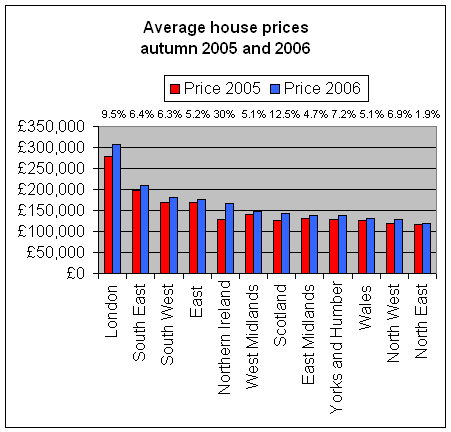
At first sight the last thing we need is another house price index. There are six already, including one official index published by the Department for Communities and Local Government. But now another Government department has weighed in. From November the Land Registry is publishing a monthly house price index and average price of a home. It claims to be better than the other six because it knows the price of every house sold – the others use samples. And Halifax and Nationwide, the two most widely quoted, only use data from their own mortgage sales. But details of every home that is sold in England and Wales are passed to the Land Registry. Indeed, for homes sold from April 2000 the price is recorded on the publicly available Land Register for everyone to see. In addition the Land Registry database of prices is now so extensive that it has a growing amount of data on the same house being sold more than once, providing a unique check that it is comparing like with like. Other surveys try to achieve the same by using what they call ‘mix-adjusted averages’ which ensure that the proportion of detached, semis, flats, and bungalows is much the same month by month.
The new figures – together with those from Registers of Scotland – allow us to look at the average price of a home in each region – and how they have grown. As the graph shows London tops the bill at £306,124, up 9.5% in the last twelve months. Only Scotland has grown faster, rising 12.5% in a year but to less than half the London price of £142,355. The north-east of England is at the bottom both for price, £119,775, and growth at just 1.9%. Figures for Northern Ireland are from Halifax and are not strictly comparable, though they do show a 30% rise to £167,391.

Source: Land Registry www.landreg.gov.uk/houseprices Registers of Scotland www.ros.gov.uk/citizen/shp.html Halifax www.hbosplc.com/economy/HousingResearch.asp
But despite the different methodologies and the different data the message from all six, sorry, seven is pretty constant. Although we’ve been told for years that house prices can’t go on rising forever at this rate, they have not fallen since 1995 and are now treble the prices fetched then. A year ago they were rising by about 3% a year. Now they are taking off again, going up, the consensus is, by around 8% a year with an average price for a home of around £200,000. At the moment there is no end in sight.
Talk's not cheap
The Department for Work and Pensions is refusing to change 0845 numbers for
the Pension Service and the Winter Fuel Helpline to free 0800 lines. Recently it
was embarrassed into changing some numbers to 0800 after it was made to reveal
that it made £268,000 from nearly 2000 lines which use 0845 prefixes. They cost
from 3.5p a minute to call and the DWP gets a share of that revenue. Many of the
lines are used by people who are looking for work and living on as little as
£56.20 a week. Shortly after this information was forced out of the DWP using
the Freedom of Information Act, the Department announced that most of these
lines for people of working age will be free from later this year. However, the
DWP has confirmed to Saga Magazine that it has no intention of changing
the 0845 numbers used by the Pension Service, the Winter Fuel Helpline,
Disability Living Allowance and Attendance Allowance. A spokesman stressed that
the Pension Credit helpline was already a Freefone 0800 number.
Although that number at least is free to call, about a third of those entitled to pension credit do not claim. The latest figures on take-up of means-tested benefits show that in 2004/05 around one and a half million people failed to claim up to £2 billion in pension credit losing an average of £23.40 a week. The figures also show that around two million people over 60 fail to claim more than £1 billion in help with council tax that could reduce their bills by an average of £600.
Bleak Christmas for thousands
There is not much hope for the 150,000 people who paid £10 or £15 a week
into the Farepak Christmas club expecting to have a few hundred pounds for the
festive season. The latest as we go to press is that they may get 4p in the
pound back from the company’s assets and maybe another 10p from the Farepak
Response Fund and they will be lucky to get much of that before Christmas.
What has surprised many people is that Christmas Clubs are not regulated like other forms of saving. If you save in a bank or building society or with a credit union not only will your money earn interest but if the institution does go bust then your savings are protected by the Financial Services Compensation Scheme. That will refund all your money up to £2000 and 90% of the next £33,000. But for some reason Farepak and the other Christmas Clubs were not included when the scheme was set up. Until they are, a bank, building society, or credit union is the only safe option for Christmas 2007.
Fake or fortune
It was an ordinary three bedroom terrace house in Oxford. But behind the
door of one of those bedrooms was a treasure - two Renaissance paintings that
had been lost since the Napoleonic wars. The simple portraits of Dominican
saints on a gold background were painted in the 1430s by a man called Fra
Angelico for the Medici family to decorate the High Altar in a Florence church.
They are two of a set of eight – the other six are scattered round museums in
Europe and America. Their owner, Jean Preston, died recently. She had inherited
them from her father who had bought them in America in the 1960s on her advice.
They remained unidentified until shortly before her death. They are expected to
fetch more than £1 million when they are auctioned in March.
 |
That amount pales into insignificance compared with the prices fetched by more modern works. The record is now held by Jackson Pollock, an American artist best known for his ‘drip’ paintings – abstract confections done in the 1940s and 1950s that are now among the most valuable works of art in the world. One is said to have changed hands privately in October 2006 for $140 million (about £75 million). Now, an American lorry driver called Teri Horton claims that a painting she bought in 1991 which looks like a Pollock, is a Pollock. She paid $5, beating down the junk shop vendor from $7. If she is right it could be worth $50 million (£27 million). But unlike the Fra Angelicos neither board, nor paint, nor quality can decide if it is genuine or not. Experts are split. Teri Horton hopes that a fingerprint on the canvas will settle the matter. |
Cheques changes
Most people don’t realise it but if you pay a cheque into your account you
can never be sure that the money is yours – even after the bank has ‘cleared’
the funds for you to draw them out. The banks never guarantee that the money
will not be taken back out of your account if they later discover that the
cheque was fraudulent. And that can cause great hardship if it happens weeks or
even months later and you have already spent it. So two cheers that at last this
archaic and unfair system is to change. From November 2007 every bank will pay
you interest two days after you pay the cheque in, let you draw it out after
four days, and guarantee it will not take it back after it has been in there six
days. Why only two cheers? Well, the ‘days’ are banking days which ignore
weekends and public holidays (when money likes a bit of a lie in). In fact six
days is always at least eight, four days is usually six and two days is often
four. Have they heard the phrase 24/7?
January 2007